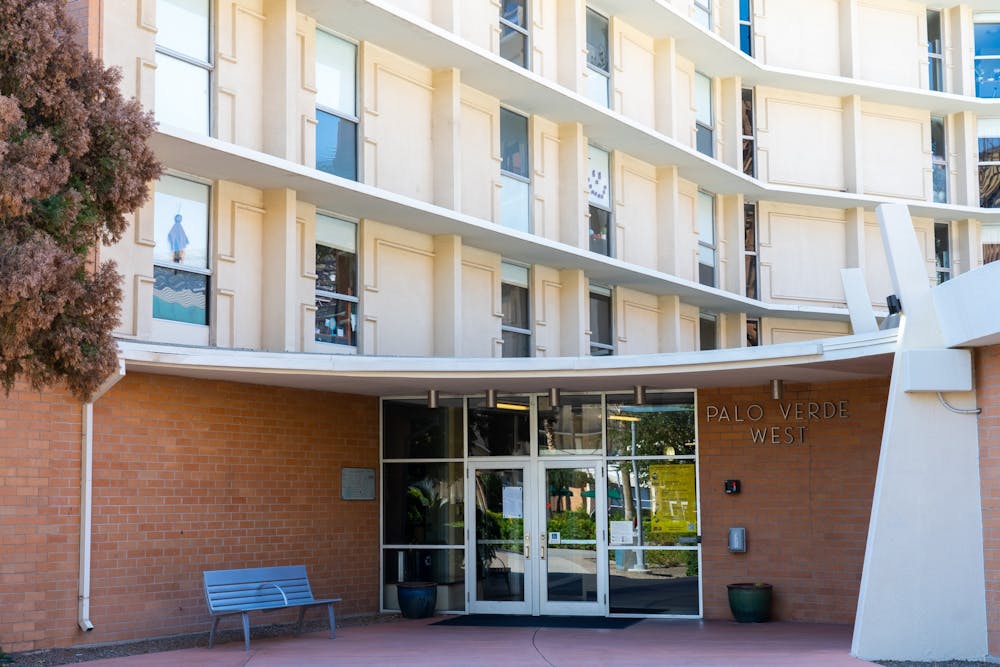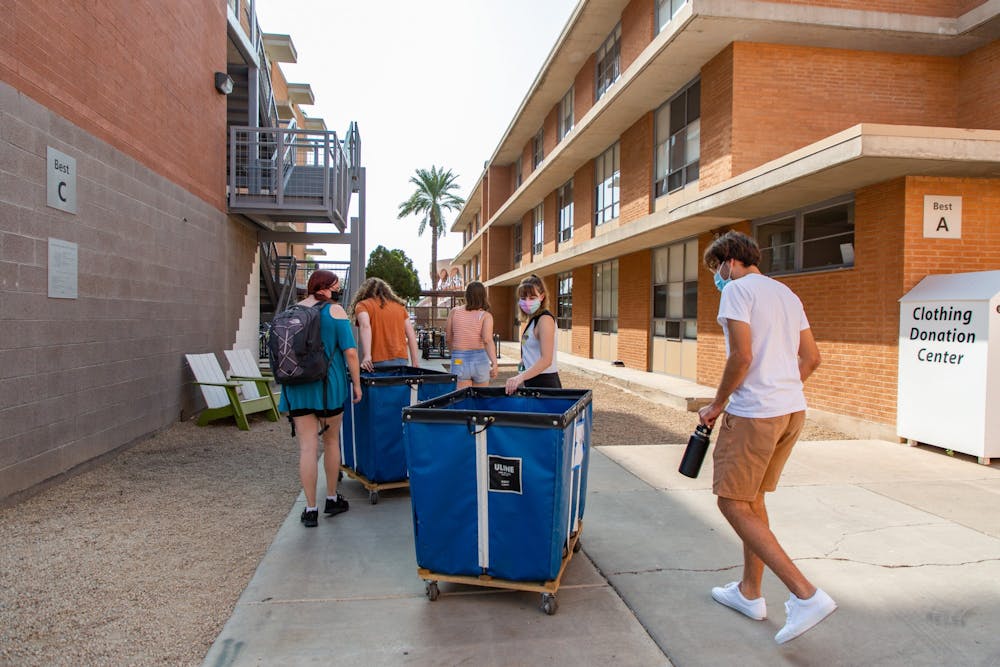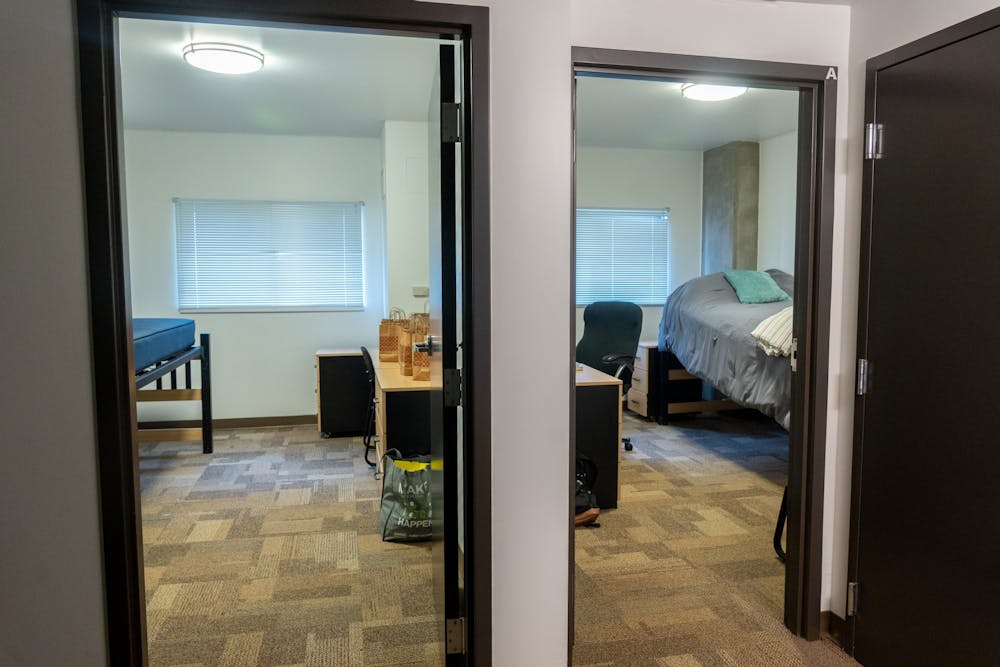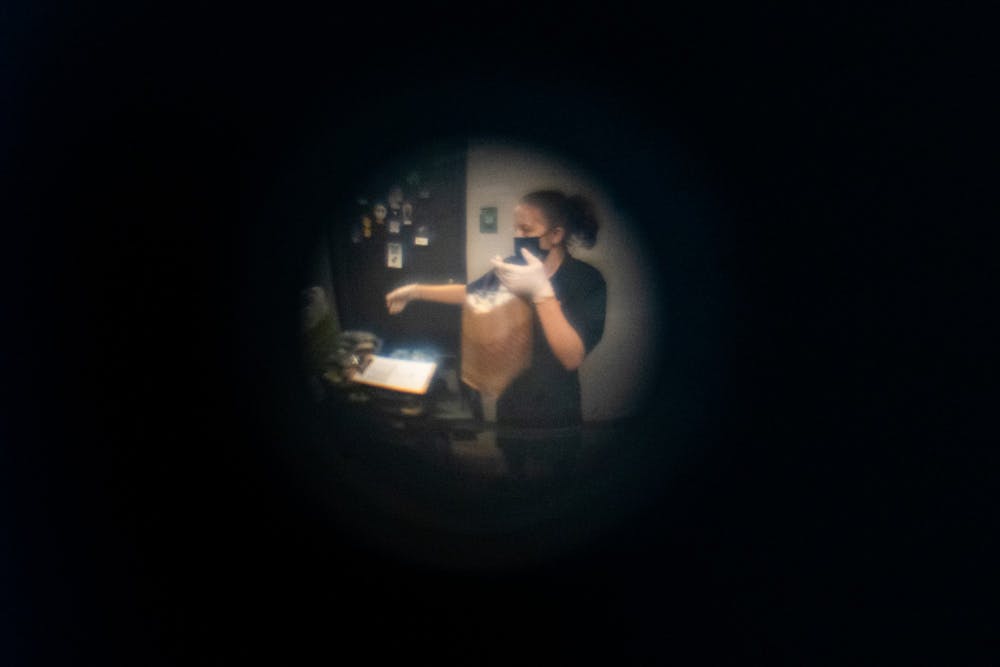Delaney Gonzalez, a former desk assistant for the Palo Verde West dormitory, spent her hours at work making sure everyone who entered was a resident, per ASU's COVID-19 policy. So Gonzalez, a freshman studying psychology, was confused when she checked a student's ID, and it was labeled with a different, nearby dormitory.
"I asked her why she's in this building," Gonzalez said. "And she said, 'Oh, I have COVID.'"
Gonzalez was shocked. Students who live in University housing and test positive for COVID-19 are often relocated to another dorm or room to isolate, and in this case, the student told her they had been moved to PVW.
However, Gonzalez said she was not told where students would be isolating until one was standing in front of her carrying Walmart bags as if they had just returned from the store.
Three weeks ago, Gonzalez quit her job as a desk assistant.
At least 10 students who tested positive for the coronavirus and were supposed to be in isolation at PVW have left their rooms and roamed around campus, three desk assistants at the residence hall said in interviews with The State Press.
The desk assistants became aware of students leaving isolation when checking them back into their dorms or during encounters in common areas.
During ASU's COVID-19 peak, students who tested positive frequently went to desk assistants to be placed in their isolation dorm in PVW. Those same desk assistants then watched students break isolation to leave their dorms and travel around the Tempe campus.
Aaron Krasnow, associate vice president of ASU Health Services and Counseling Services, said ASU does not have any policies in place that prevent a student in isolation from leaving their room.
"There's no circumstance in America, except for a judge's orders, that locks anybody in their house — none," Krasnow said. "The public health statutory authority in that regard is used almost never."
Over the past two weeks, the COVID-19 situation at ASU has improved as active cases among students living on the Tempe campus have decreased. But on Sept. 3, there were 369 active positive COVID-19 cases at the Tempe campus, where PVW is located.
Around that time, encountering students moving into isolation and seeing others who should have been in isolation leaving their rooms were regular occurrences for the desk assistants.
One PVW desk assistant studying political science, who was granted anonymity because she fears repercussions for speaking out, said there were at least 10 instances when students arrived at the front desk saying they needed an isolation space because they had tested positive for the coronavirus.
A PVW desk assistant studying psychology, who was also granted anonymity because they feared repercussions and were directly told not to talk to the press, said they would see students leave quarantine for up to a full day at least once a week.
"It's because of me being a desk assistant that I see all of the people that are in isolation and have COVID coming in and out of the building,” Gonzalez said. "A lot of the residents don't even know that there's people that have COVID in the building."
Frequent exposure
Exposure to the coronavirus began almost immediately for the desk assistants. As the semester started, the exposure continued, and to the desk assistants, it became clear cases would rise.
The political science student said since August move-in, she knew she had come in close contact with at least five students who had tested positive. She said she had given a tour of the dorm rooms to a family and a student. That same student tested positive just days later, she said.
Students would approach her as recently as last week with move-in carts full. She would ask how she could help them, and students would say they were there to move in because they had tested positive for the coronavirus.
"They're right in front of me as they pass the desk," she said. "Then they're passing through all these residents that are coming in and out of the building, they just touched a door handle and now they're going to go to the elevator to go upstairs.
"It's kind of a problem when (University and Housing administrators) don't tell us that people with COVID are going to move in," she said.
Usually, desk assistants have a few tasks during a shift: check students in, help students who are locked out of their room and answer questions residents may have.
But the job has changed during COVID-19. Desk assistants remind students to wear their masks properly. They help move students in, they help move them out.
Oftentimes, they are the first point of contact for students in need of an isolation space when arriving at PVW. They then connect the students with a community director who can help them get to their room.
"We were like the last resort for COVID students," Gonzalez said.
While students who tested positive were staying at PVW, desk assistants would pick up their food delivery orders and take them to the students' doors. Once the students had completed their 10-day isolation, the desk assistants would take their keys.
Gonzalez said on one occasion, she asked two girls who were returning from the POD market for their IDs. The girls said they did not have any and explained they were from Palo Verde East but isolating at PVW.
In one situation, the psychology student was on their way to start a shift, but upon entering an elevator, two girls who were inside told them they didn’t think they should ride with them because they had COVID-19.
"It just shocked me how casual they spoke about it when it is something so grave," the desk assistant studying psychology said.
University President Michael Crow has maintained the Community of Care plan created to aid in the opening of in-person classes is dependent on increased personal accountability. Krasnow believes nearly no one has violated the Community of Care "because they're a bad person, or they're like a sociopath."
If the University is worried about the community or an individual and their actions, they will have an "educational conversation" about it before punishing a student, Krasnow said.
READ MORE: Inside ASU's COVID-19 exposure management system
The desk assistant studying political science said she is never sure what to do when she sees someone who has tested positive outside of their isolation room. Does she ask them to go back to their room? Does she tell everyone around the positive student to go get tested?
The University has not helped her answer these questions or provided any training to handle the situation, she said.
There is also a chance those students may have been cleared to return to campus, but desk assistants would have no way of knowing unless they asked the student, something they said they don't feel comfortable doing given they may still be positive.
Students can leave isolation once they have gone 10 days without symptoms, or they have spent 10 days in isolation along with 24 hours with no fever without help from fever-reducing medication if they did experience symptoms, according to the University’s coronavirus FAQ page.
How isolation and moving into an isolation space works
Krasnow said when an ASU housing resident tests positive, they are notified about who they should contact. That contact "is not a desk assistant," he said.
However, this hasn't stopped desk assistants from being the first point of contact anyway.
"It's someone in the leadership team who's responsible for a larger team that manages all the logistics" required in moving a student into an isolation space, he said. The team ensures the student has a place to go, has everything they need and does not put anyone else at risk by moving to a different space if needed, Krasnow said.
But, despite the effort to communicate what students need to do, "you can imagine a scenario" where students may not fully understand the process of moving into isolation, Krasnow said.
He said desk assistants should be prepared for a reality where they may need to help a student who has tested positive, because students may come to them for help.
The desk assistants said they never received any specific instruction on how to handle or work with the active COVID-19 cases they would encounter while on the job.
Gonzalez, the former desk assistant, said whenever an incident would happen regarding the coronavirus, the community director would only then explain how they were to address the student's needs.
"We never got the proper training for anything related to COVID," she said.
The circumstances in residence halls described by Gonzalez and the two other desk assistants are examples of why ASU community members should act "as if anyone can be positive," by wearing face coverings and social distancing, said Vice President of Student Services Joanne Vogel.
According to a University spokesperson, the encounters the desk assistants described would not be considered high-risk exposures because the interactions didn't exceed 10 minutes.
The University's strategy is "designed to limit or eliminate any interaction between a student transitioning to isolation and a front desk assistant" and students going to isolation should have no need to stop at the desk for any reason, the spokesperson said.
Students moving into isolation should have a Student Advocacy and Assistance Engager to assist them, and they are given a link to ASU maps so they can find their temporary room, the spokesperson said.
Krasnow said that while desk assistants felt the students had not received directions, it’s also possible that the students who tested positive did not read all of the directions they were given.
"If they stop at a desk it is due to being lost and needing direction to their room," the spokesperson said in an email. "Everything that an isolation student needs is managed away from the desk."
The spokesperson added that a layer of Plexiglas around the desks adds extra protection for the workers. But all three desk assistants said during the encounters at the desk, the students with active cases would frequently go around the plexiglass to speak to them.
In an email, Vogel said desk assistants can write up reports of potential violations even if they do not know the student's name. The University plans to continue to remind student housing workers to report anything to administrators with as much information as possible, she said.
Ideally, students who need to self-isolate due to positive test results or being at high risk for exposure should be placed within their own residence hall. But sometimes students must be moved across campus, typically to a nearby residence hall, Vogel said.
Different guidelines exist for students who need to self-isolate. When students have tested positive for the coronavirus, they are placed in isolation, Krasnow said.
"Isolation means that you need to have your own bedroom and your own bathroom," Krasnow said. "And then basically you're not to leave your space unless it's an emergency."
But students who are placed in quarantine, which means they could have been exposed to a positive case, can leave their room as long as they are not around other people, Krasnow said.
Health Services has heard of students who were confused about guidance, but COVID-19 positive students leaving isolation is not something they have heard about frequently.
"But I can see something like that happening," Krasnow said.
Most residents did not know there were cases in PVW, the desk assistants did
The desk assistants knew cases would rise. They were the ones watching students from other residence halls enter PVW to isolate; they were the ones seeing students go out late at night in groups dressed to party; and they were the ones listening when students called the front desk to ask for help.
As residents, they would exit their rooms each day to go to class or work, and the hall would be lined with brown bags filled with food for students who were isolating or in quarantine.
Gonzalez typically returns to her family home every other weekend. Some of her family members are high-risk, and since she was seeing or encountering many possible positives while working as a desk assistant, Gonzalez did not want to take the risk of being exposed and then bringing the virus home to them.
"I would always come up with scenarios in my head, like what I would do if my family members got sick," Gonzalez said. "I don't think I could live with myself because of how serious it could be for them. It would cause me anxiety, just like thinking about it when I would come home and hug them."
Like hundreds of other students, Gonzalez would end up filling out her License Agreement Release Form to leave Tempe and her job to return home.
READ MORE: Hundreds of students have been approved to leave Tempe dorms
The desk assistants said they would move out at least four students a day at PVW during their shifts before the Sept. 20 deadline passed to receive a proration of room and board.
In August, 9,708 students had moved into a residential community on the Tempe campus for the semester. By Sept. 20, 654 residents had submitted a License Agreement Release Form allowing them to move out and not have to pay their room and board for the spring semester, a University spokesperson said.
The anonymous desk assistant studying psychology said during that time, it was "just one big cycle." A student would move out because they were scared of COVID-19, and then another would replace them because they had COVID-19 and needed an isolation space, they said.
Since Aug. 1, there have been 1,835 cumulative COVID-19 cases within the ASU community. But while cumulative cases have gone up, active cases have decreased to 60 on the Tempe campus.
The two anonymous desk assistants said the situation is calmer now — they just hope it stays that way.
"The University does whatever they want to do at the end of the day," the desk assistant studying psychology said. "We can't really control it."
Reach the reporter at wmyskow@asu.edu and follow @wmyskow on Twitter.
Like The State Press on Facebook and follow @statepress on Twitter.

Wyatt Myskow is the project manager at The State Press, where he oversees enterprise stories for the publication. He also works at The Arizona Republic, where he covers the cities of Peoria and Surprise.







